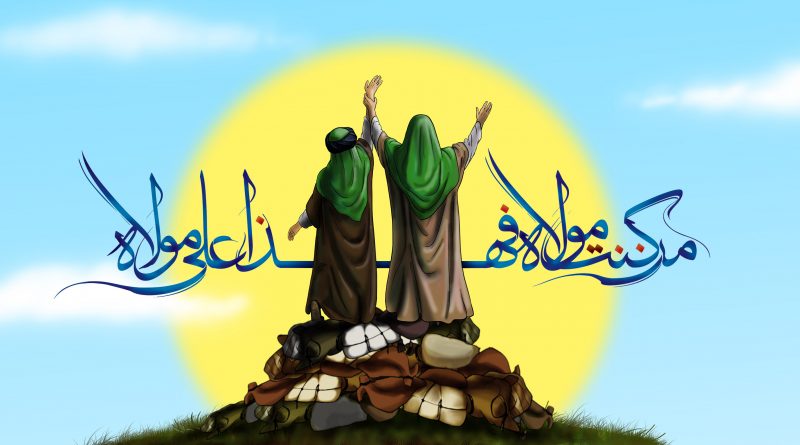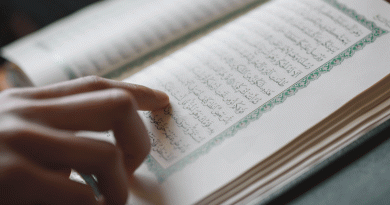When did Shia ISlam start?
Naturally the question arises as to when Shi‘ism started. There are many hadiths narrated by both Shi’a and non- Shi’a scholars regarding the issue of Imamate that will be studied later when discussing Shi‘i doctrines. In what follows, however, we will study only some hadiths in which the Prophet Muhammad spoke of a group of people as “Shi’a” (followers) of Ali, and we will then refer to some other reasons from hadiths and the history of Islam. All hadiths mentioned below are cited from respected Sunni sources. These are only a few of the most important narrations, and there are many more to be found in the sources mentioned here as well as others.
(1) Ibn ‘Asakir (d. 571 A.H) narrated from Jabir b. ‘Abdullah al-Ansari that he said:
Once we were with the Prophet Muhammad, when Ali arrived, upon which the Prophet said, “I swear by Him who has my life in His hand that surely this man and his Shi’a will be happy on the Day of Resurrection”. Then the verse “Surely those who believe and do good deeds are the best of creation” (98:7) was revealed. Later, whenever the companions of the Prophet Muhammad saw Ali coming, they would say, ‘The best of creation has come’. (Ibn ‘Asakir, Vol. 2, p. 442 & al-Suyuti, Vol. 6, p. 589)
(2) Ibn Hajar (d. 974) narrated from Ibn Abbas that when the verse (98:7) was revealed the Prophet told Ali:
Those are you and your Shi’a. On the Day of Resurrection you will be pleased and well pleasing (to God), and your enemies will come angry and will be seized by their necks. (Ibn Hajar, Section 11, Chapter 1, the Verse 11)
(3) Ibn al-Athir (d. 606) narrated that, addressing Ali, the Prophet said:
O Ali! You and your Shi’a will reach God being pleased with Him and well pleasing Him, and your enemies will reach Him, being angry and will be seized by their necks. Then the Prophet demonstrated how this would be by putting his hand on his neck. (Ibn al-Athir, the entry “qa-ma-°a”)
There are other hadiths in which the Prophet Muhammad, addressing Ali, used the expression “our Shi’a”. This is in line with what was asserted above that the Shi’a are those who follow Ali, in accordance with the teachings of the Prophet and not because of their own personal decision. For example, Ibn ‘Asakir narrated that the Prophet said:
“Surely there is a spring in Paradise sweeter than nectar, smoother than butter, cooler than ice, and more fragrant than musk. In that spring is the clay (ñínah) from which we (my household and me) were created and our Shi’a are made from the same clay.” (Ibn ‘Asakir, Vol. 1, p. 129, No. 180)
There are yet other hadiths in which the Prophet, addressing Ali, used the expression “Shi’a of your descendants”. This confirms what was suggested above, that the Shi’a are those who follow Ali because they believe in the institution of Imamate. As we will see in detail, the Shi’a believe that Ali was the first Imam and after him the institution of Imamate continued in those offspring of Ali and Fatimah that were chosen by God and introduced by the Prophet. For example, Zamakhshari (d. 528 A.H) in his Rabi‘ al-Abrar reports that the Prophet said: “O Ali! When the Day of Resurrection comes I will hold on to God, you will hold on to me, your descendants will hold on to you and their Shi’a will hold on to them. Then you will see where we will be taken.”
It has to be noted that according to the Qur’an, prophethood was also inherited. The Qur’an says: “And surely we have sent Noah and Abraham, and we placed prophethood and the Book in their offspring”. (57:26) This means that those who were qualified to be chosen as prophets by God were included in their offspring.
In addition to the above-mentioned hadiths and their like, and the hadiths on Imamate, there are many other reasons that make the appearance of a group of people such as the Shi’a in the lifetime of the Prophet a very natural and even necessary phenomenon. For example, at the beginning of Islam when the Prophet was asked by God to start his public invitation to Islam by inviting his close relatives, he called his relatives to a meal. After the meal the Prophet introduced his mission and invited the guests to Islam and stated that whoever believed in Islam among them and assisted him would be his successor. All kept silent. The only one who accepted the invitation to assist him was Ali, a teenager at that time. The Prophet asked him to sit and repeated his invitation for the second and the third time. Again and again it was just Ali who expressed his readiness to support the Prophet. The Prophet accepted Ali’s submission to the will of God and carried out Allah’s command to designate him as his successor. This event is documented in many sources.
In a very important statement, the Prophet clearly affirmed that Ali was truthful and free of false beliefs and wrong acts, be it in his personal conduct or in his speech and judgements, and implicitly asked Muslims to follow him. Umm Salamah reported that the Prophet said: “Ali is always with the truth (al-1aqq) and the truth is always with him, and until the Day of Resurrection they will not separate from each other”. This particular hadith is narrated by Ibn ‘Abbas, Abu Bakr, ‘A’ishah, Abu Sa’id al-Khuddari, Abu Layla, and Abu Ayyub al-Ansari. The Prophet is also quoted as saying, “May God bless Ali. My Lord, make the truth always be with him”.
The Prophet also asserted on several occasions that Ali was the most knowledgeable among the people in matters pertaining to Islamic sciences. For example, the Prophet said: “Wisdom has been divided into ten parts: nine parts have been given to Ali and one part has been distributed among the rest of the people”. Later the second Caliph reaffirmed the saying of the Prophet when he said, “May God never afflict me with a difficult task when Ali is not present”.
One also has to take into account the valuable and vital services and sacrifices of Ali in order to be able to realise his position among Muslims. For example, when the infidels of Mecca planned to kill the Prophet, and God informed him of their plot, the Prophet asked Ali whether he would be willing to sleep in his place so that the pagans would think that he was still at home, allowing him to safely leave Mecca. Ali accepted this task, on the occasion of which the verse was revealed, “And among people are those who sell their souls to acquire divine pleasure” (2:207). The emigration of the Prophet from Mecca to Medina marks the beginning of the Islamic Calendar. Ali served the cause of Islam by fighting in the Battles of Badr, Uhud, Khaybar, Khandaq and Hunayn, in all of which he played crucial roles. These are all registered in numerous historical works and collections of hadiths by non-Shi’a scholars.
The Prophetic hadiths on the issue of the Imamate in general, and about Ali in particular, need to be studied separately. However, I would like to conclude the discussion here by referring to the well-known hadith of Ghadir Khumm. Returning from his last pilgrimage to Mecca, the Prophet asked thousands of Muslims accompanying him to stop on the way. He stood on a platform or pulpit made for him out of saddles and said, “Whoever has adopted me as his master (mawlā), Ali now is his master”. Then, those present, including the first and second Caliphs to be, paid allegiance to Ali and congratulated him. This hadith is transmitted by more than one hundred sources. For a comprehensive list of non-Shi’a sources of this hadith, see ‘Abaqat al-Anwar by Mir Hamid Husayn al-Hindi (d. 1306 A.H) and Al-Ghadir by ‘Abd al-Husayn al-Amini (d. 1390 A.H). Having affirmed the veracity of the hadith, some Sunni writers have interpreted the term mawlā used in this hadith in another way. According to them, the term mawlā here is used in the sense of friendship. Whether this can be accepted or not, there is no doubt that this tradition and the event gave Ali a unique and central position among the companions of the Prophet.
Thus, it seems that the different sets of hadiths along with the historical evidence mentioned above leave no doubt that during the lifetime of the Prophet many Muslims came to love Ali deeply and sought his company, and were determined to follow him after the Prophet. These people were so frequently and significantly referred to as the Shi’a of Ali that gradually the term “Shi’a” became synonymous with the Shi’a of Ali. More important than this is the fact that the idea of the Imamate of Ali certainly started in the lifetime of the Prophet Muhammad. The demise of the Prophet naturally brought the issue into focus and distinguished those who still believed in the necessity of following Ali from other Muslims, who sooner or later came to believe in the institution of the caliphate as the successorship to the Prophet in ruling the Islamic society, and not as a divinely appointed position. Describing events after the death of the prophet, Al-Mas‘udi (d. 345 A.H), a great Sunni historian, writes: “Indeed Imam Ali and those of his Shi’a who were with him stayed in his house at the time that the allegiance to Abu Bakr was made.”
Later, certain events, such as the wars that occurred during the Caliphate of Ali and the event of Karbalā in which Husayn, the third imam of the Shi’a and seventy two people of his family and companions were killed, defined Shi’a identity more sharply. For example, we find in one of the early works that Ali, condemning Talhah and Zubayr, said: “Surely the followers of Talhah and Zubayr in Basra killed my Shi’a and my agents”. Abū Mikhnaf (d. 158 A.H) reports that after the death of Mu’awiyah the Shi’a gathered at the house of Sulayman b. Surad and he told them: “Mu’awiyah has died and Husayn has refused to pay allegiance to the Umayyads and has departed towards Mecca and you are his Shi’a and the Shi’a of his father”.



